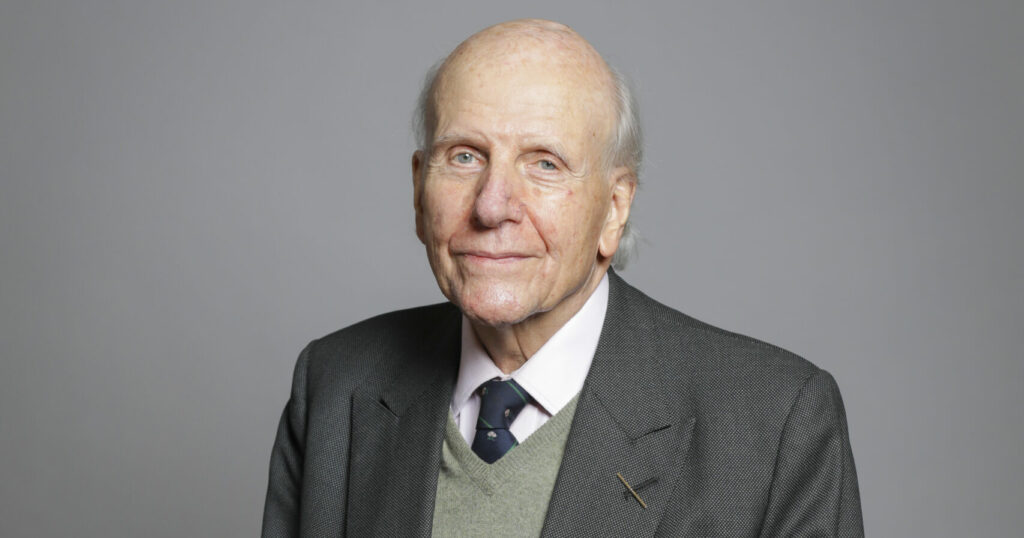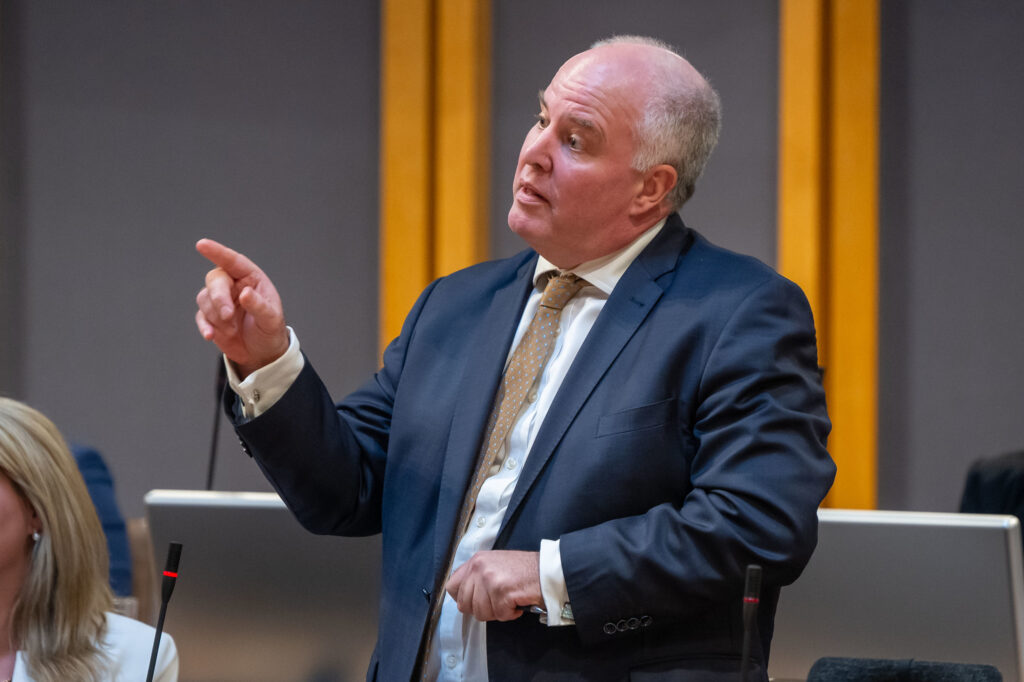Geraint Talfan Davies pays tribute to Lord David Rowe-Beddoe, IWA Life Fellow, for his contributions to the economy and ceaseless advocacy for the arts in Wales.
When people bemoan the loss of the Welsh Development Agency from Wales’s institutional armoury, the chances are that they are remembering the work of its best known and most successful Chairman, Lord (David) Rowe-Beddoe, who died last week aged 85.
David Rowe-Beddoe was a force. In Wales and in the many organisations that he led – impacting on our economy and our arts – he displayed not only the confident acuity of an international businessman, but also the polished flair of the thespian that he became in his university days at St. John’s Cambridge, befitting the son of a Welsh opera-singer mother, Gwendolan Evans.
When he was appointed Chairman of the Welsh Development Agency in 1993, he was little known in Wales.
Despite an early education at Llandaff’s Cathedral School, his education and his business career took him away from Wales – to Stowe School and then Cambridge, and onwards to join Thomas De La Rue – a printer of banknotes for the world – where, within ten years, he became its Chief Executive. Five years later, in 1976, he took on another international assignment for the American cosmetics company, Revlon – as President of its operations in Europe, Latin America, the Middle East and Africa. Then in 1983 he became Chief Executive of the investment company, Morgan Stanley-GFTA, where he stayed until 1991.
When he was appointed Chairman of the Welsh Development Agency in 1993, he was little known in Wales. While his international business credentials were clearly beyond question, a few Welsh eyebrows were raised upon reading that he was ‘a Monaco-based businessman and Tory party fundraiser.’ Sceptics need not have worried. His commitment to Wales was total, and his achievements in the nine years he held the post rank him as perhaps Wales’s most effective international ambassador.
His period of office coincided with the high point of inward investment to the UK, and David Rowe-Beddoe took full advantage to deepen the relationship with Japan. During his period at the WDA the number of Japanese companies setting up shop in Wales rose from 33 to 65, and as late as 2018 were still providing more than 6,000 jobs in Wales. He also presided over the merger of the WDA with the Development Board for Rural Wales.
In the mid 1990s, when at BBC Wales, I had the privilege of seeing him at work in Japan. It was 1995 and the BBC National Orchestra of Wales, led by its then Principal Conductor, Tadaaki Otaka, was touring Otaka’s homeland, with the WDA taking full advantage to promote Wales. After the final concert in Tokyo, a reception took place at the British Embassy. The British Ambassador, immensely impressed by the effectiveness of the WDA, informed me that it was the biggest turnout of Japanese industrial top brass he had ever seen in one room.
David, never short of chutzpah, reminded this august gathering of the great favour that Wales had done Japan during the Russo-Japanese war of 1904-05. He put the Japanese victory down to the fact that its navy had been powered by smokeless Welsh anthracite, thus allowing it to linger below the horizon, unseen by the enemy. The Russian navy, on the other hand, powered by very dirty brown coal, left smoke trails that always gave away the fleet’s location. The story went down very well.
He nursed Wales’s relationship with Japan assiduously and was later awarded Japan’s Order of the Rising Sun, with Gold Rays. (I am sure he loved those last three words.) It was no surprise that, under his chairmanship, the Wales Millennium Centre ended up with a Japan room.
Robust debate and agenda-setting research.
Support Wales’ leading independent think tank.
His period at the WDA bridged the last days of John Major’s Conservative Government, the early years of Tony Blair’s Labour Government, and the opening of the National Assembly for Wales, and it was significant that both sides of the political spectrum had confidence in him. He was knighted in the first birthday honours list of the new millennium for his services to industry and economic development in Wales.
The other side of David Rowe-Beddoe was his love for and commitment to music and the arts. It was something imbued in him by his upbringing. His singer mother became one of the first teachers at the Welsh College of Music and Drama, then operating in Cardiff Castle. At Cambridge he was an organ scholar and actor, acting alongside Ian McKellen and Derek Jacobi. His later friendship with Richard Burton was such that he played the organ at Burton’s funeral in Switzerland.
It was in 2001, while he was still Chairman of the college, that the Welsh Government asked him to step into the Chair at the embryonic Wales Millennium Centre project, at that time in a crisis over its cost and funding.
Small wonder, therefore, that he took so much pleasure in his role at what had now become the Royal Welsh College of Music and Drama. He was its chairman from 2000-2004 and its President for a further 15 years. As the Principal, Helena Gaunt, said in her tribute: “Very simply, he loved the college, and the College loved him back.” He was instrumental in raising substantial funds, such that the college now contains an array of spaces that are testimony to his associations – the Richard Burton Theatre, the Anthony Hopkins Centre, and the Dora Stoutzker Hall. The naming of the Rowe-Beddoe studio at the college was a richly deserved mark of gratitude.
It was in 2001, while he was still Chairman of the college, that the Welsh Government asked him to step into the Chair at the embryonic Wales Millennium Centre project, at that time in a crisis over its cost and funding. It was the Welsh Government’s trust in his capabilities that finally got the project over the line, along with a realistic operating budget. To have delivered two of the Welsh capital’s three prime music performance venues was and is no mean achievement.
Along with the peerage that came his way in 2008, his last decades were equally industrious: President of Cardiff Business Club, Chairman of Cardiff Airport, Patron of the Prince’s Trust, Deputy Chairman of the UK Statistics Authority and, in the Lords, membership of All-Party Parliamentary Groups on the Armed Forces, China and Hong Kong, and a Lords’ committee investigation of the Barnett formula for funding the devolved administrations.
Less well-known was his involvement with the Church in Wales, a mark of a deep faith that was also expressed in the motto on the arms associated with his peerage – Duw a’ch cynhalio (May God sustain you). He was not only a member of the Representative Body of the Church in Wales for ten years, but also chaired an influential review of the church’s finances.
All in all, he made an astonishing contribution to Welsh life over his last three decades. His intelligence, his acumen, and sometimes fierce focus were balanced by a great capacity for friendship and an ability to charm. It was a formidable combination that benefited our national life in so many ways. We should be deeply grateful for it.
Lord Rowe-Beddoe, born 19 December 1937, died 15 November 2023. He is survived by his second wife, Madeleine, and three children by a first marriage.
All articles published on the welsh agenda are subject to IWA’s disclaimer. If you want to support our work tackling Wales’ key challenges, consider becoming a member.





